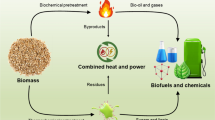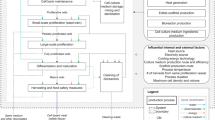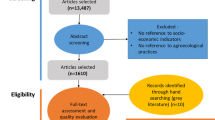Abstract
Purpose
The assessment of biofuels has until now mainly focused on energy demand and greenhouse gas emissions. Only little attention has been given to other impacts, although the general importance of water use for the life cycle assessment (LCA) of agricultural products has been recognized in recent publications. The aim of this work is to assess in detail the water consumption along a biofuel production chain taking into account irrigation efficiencies, levels of water scarcity, and type of feedstock, and to integrate those results in a full LCA. Furthermore, we compare the results for biofuels from various feedstocks and regions with conventional petrol.
Methods
We calculate the water consumption and overall life cycle assessment results in a case study for the production of methyl ester from irrigated and non-irrigated rapeseed. The results are compared with other irrigated and non-irrigated biofuels based on different feedstocks.
Results and discussion
Water consumption in biofuel production chains based on non-irrigated crops does not vary greatly and is in the same range as for fossil fuel. In contrast, as a consequence of irrigation, agricultural water consumption dominates the overall results of all irrigated crops. Consequently, the level of water scarcity plays a key role for the LCA results. In our case study, the environmental impacts of methyl ester from irrigated rapeseed in a water-scarce region, measured in aggregated Eco-Indicator 99 scores, are almost doubled by water consumption. Variations in irrigation efficiency, however, are of little influence on the results, as the assessment method used here is based on consumptive water, which depends mainly on the evapotranspiration of the crop.
Conclusions
The focus on greenhouse gas emissions of the main regulatory schemes neglects other relevant environmental impacts and may provide the wrong incentives. Water consumption may thus become a major concern, offsetting the benefits of biofuel use with respect to climate change.




Similar content being viewed by others
References
Alturria L (2008) Cultivos energéticos: estimación de costos de producción. Oral presentation, 9 May 2008. Facultad de Ciencias Agrarias, UNCuyo., Mendoza, Argentina
Arena AP, Canizo JR, Sanchez BM (2002) Perfil ambiental de la generación termoeléctrica en la Argentian en el cuatrienio 1997–2000. Avances en Energías Renovables y Medio Ambiente 6(2):7–12
California Environmental Protection Agency (2009) Proposed regulation to implement the low carbon fuel standard—volume I. Staff report: initial statement of reasons
Chiu Y-W, Walseth B, Suh S (2009) Water embodied in bioethanol in the United States. Environ Sci Technol 43(8):2688–2692
Colomer JS, Emili L, Castillo X, Kristich C (2008) Personal communications collected in interviews with Ing Dr. Jorge Silva Colomer (INTA Junin), Luis Emili (UNCuyo), Ing Xavier Castillo (INTA La Consulta), Ing. Carlos Kristich (Municipality Alvear)
De Fraiture C, Berndes G (2009) Biofuels and water. In: Howarth RW, Bringezu S (eds) Biofuels: environmental consequences and interactions with changing land use: proceedings of the Scientific Committee on Problems of the Environment (SCOPE) International Biofuels Project Rapid Assessment, 22–25 September 2008, Gummersbach, Germany. Cornell University, Ithaca, pp 139–153
Dominguez-Faus R, Powers SE, Burken JG, Alvarez PJ (2009) The water footprint of biofuels: a drink or drive issue? Environ Sci Technol 43(9):3005–3010
Donato L, Huerga I, Hilbert J (2008) Principales Insumos en la Producción de Biocombustibles. Un Análisis Económico. Balance Energético de los cultivos potenciales para la producción de biocombustibles. . Instituto Nacional de Tecnología Agropecuaria (INTA)—Istituto de Ingenieria Rural–CIA–CNIA., Castellar, Argentina
Donato L, Iriarte L (2008) Personal communications collected in interviews with Ing. Lidia Donato (INTA Castellar) and Ing. L. Iriarte (INTA Barrow)
European Parliament (2000) Directive 98/69/EC of the European Parliament and of the Council of 13 October 1998 relating to measures to be taken against air pollution by emissions from motor vehicles and amending Council Directive 70/220/EEC
European Parliament (2009) Directive 2009/28/EC of the European Parliament and of the Council of 23 April 2009 on the promotion of the use of energy from renewable sources and amending and subsequently repealing Directives 2001/77/EC and 2003/30/EC. vol COM(2008)0019–C6-0046/2008–2008/0016(COD)
Faist Emmenegger M, Reinhard J, Zah R (2009) SQCB—sustainability quick check for biofuels. Second draft, 18th February 2009—intermediate background report. With contributions from T. Ziep, R. Weichbrodt, Prof. Dr. V. Wohlgemuth, FHTW Berlin and A. Roches, R. Freiermuth Knuchel, Dr. G. Gaillard, Agroscope Reckenholz-Tänikon. Empa, Dübendorf, Switzerland
FAO (2008) CROPWAT 4.3 Decision Support System (Food and Agriculture Organization)
Frischknecht R, Jungbluth N, Althaus H-J, Doka G, Heck T, Hellweg S, Hischier R, Nemecek T, Rebitzer G, Spielmann M, Wernet G (2007) Overview and methodology. Ecoinvent report No. 1. Swiss Centre for Life Cycle Inventories, Dübendorf
Goedkoop M, Spriensma R (2001) The Eco-Indicator 99: a damage oriented method for life cycle impact assessment: methodology report. Publikatiereeks produktenbeleid; nr. 36A. Ministerie van Volkshiusvesting, Ruimtelijke Ordening en Milieubeheer, Den Haag
Iriarte LB (2002) Colza: cultivares, fechas de siembra, fertilizacion. Instituto Nacional de Tecnología Agropecuaria (INTA), Chacra Experimental Integrada Barrow, Tres Arroyos, Argentina
Jungbluth N, Chudacoff M, Dauriat A, Dinkel F, Doka G, Faist Emmenegger M, Gnansounou E, Kljun N, Schleiss K, Spielmann M, Stettler C, Sutter J (2007) Life cycle inventories of bioenergy. Ecoinvent report no. 17. Swiss Centre for Life Cycle Inventories, Dübendorf
MinöStV (2008) Mineralölsteuerverordnung (MinöStV), Änderung vom 30. Januar 2008
Nemecek T, Kägi T (2007) Life cycle inventories of Swiss and European agricultural production systems. Final report ecoinvent V2.0 No. 15a
Pfister S, Bayer P, Koehler A, Hellweg S (2011) Environmental impacts of water use in global crop production: hotspots and trade-offs with land use. Environ Sci Technol 45(13):5761–5768
Pfister S, Koehler A, Hellweg S (2009) Assessing the environmental impacts of freshwater consumption in LCA. Environ Sci Technol 43(11):4098–4104
PRé Consultants (2006) Simapro 7
Rodríguez P (2008 ) Oral communication by Ing. Patricio Rodríguez, Departamento de Irrigación, 12.03.2008
Service RF (2009) Another biofuels drawback: the demand for irrigation. Science 326(5952):516–517
Shiklomanov IA, Rodda JC (eds) (2003) World water resources at the beginning of the 21st century. International hydrology series. Cambridge University Press, Cambridge
Zah R, Böni H, Gauch M, Hischier R, Lehmann M, Empa PW (2007) Ökobilanz von Energieprodukten: Ökologische Bewertung von Biotreibstoffen. BfE/BAFU/BLW, Bern, Switzerland
Acknowledgments
We thank the Civil Service Authorities in Switzerland for their support of the project.
Author information
Authors and Affiliations
Corresponding author
Additional information
Responsible editor: Thomas Koellner
Electronic supplementary material
Below is the link to the electronic supplementary material.
ESM 1
(DOC 79 kb)
Rights and permissions
About this article
Cite this article
Faist Emmenegger, M., Pfister, S., Koehler, A. et al. Taking into account water use impacts in the LCA of biofuels: an Argentinean case study. Int J Life Cycle Assess 16, 869–877 (2011). https://doi.org/10.1007/s11367-011-0327-1
Received:
Accepted:
Published:
Issue Date:
DOI: https://doi.org/10.1007/s11367-011-0327-1




